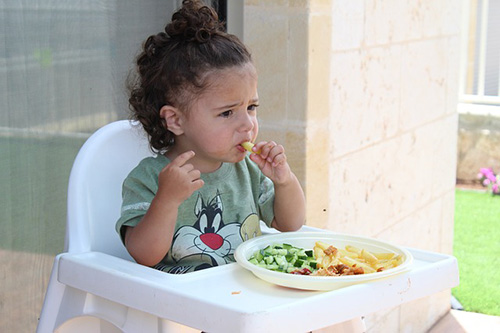Sometimes Toddlers Seem to Eat Very Little
Have you ever packed a lunch only to have most of it come home to you? Sat through a breakfast or dinner and watched your child just stare or play with their food? Toddlers and small children sometimes seem like they can go days without food to their parents, and I am often approached with worries that a child is not eating enough. In our super-sized portion world, when a child only eats a quarter, it just looks off to us. But, the truth is, this is normal behavior for them and they are incredibly intuitive about their needs.
So How Much Does a 2 or 3yr old Need to Eat?
This is a little complicated because much like an adult, it depends on some individual factors (i.e are they active?), but in general, toddlers need 1000-1400 kcal a day (about half that of an average adult). Their diets should be balanced, just like ours, and include all of the food groups. Make sure the base of their diet is at least 2-4 cups of vegetables and fruits. A ½ cup serving would be the equivalent of a fruit and veggie pouch, a small piece of fruit chopped up, or a handful of steamed veggies. For grains (or starchy veggies like potatoes) need about 3-5 ounces. An ounce of grains would be one slice of bread, ½ cup of pasta, cereal, or potatoes. Dairy or dairy substitutes should be included by about 2 cups through either milk or yogurt. The needs for protein foods, such as meat, is only about 2 ounces, which is the equivalent of a slice of lunch meat, an egg, or a cheese stick.
Ways to See if Your Toddler is Eating Enough
If you are concerned your child isn’t eating enough at meals, try and observe the following: are they drinking a lot of milk or juice? These liquids can make a child feel full and discourage food intake. Also, the average child snacks 5 times a day now! That can interfere with intake at meals when more nutritious food is served. Limit snacks to certain times a day, rather than at every transition. Let your child take some part in meal and snack prep and try not to make eating a battle. If you still have concerns, be sure to chat with your doctor or a registered dietitian, who can track growth and intake and help you with solutions.
In Health, Angela
